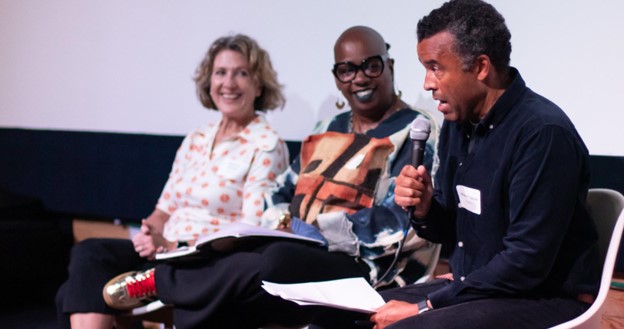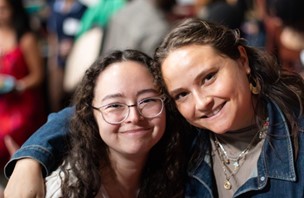Exploring a new format for interdisciplinary networking
By Logan Woodruff, AICP, Events Program co-Manager, July 30, 2024
In urban planning, fostering connections and collaborations across disciplines is essential. Recognizing this, APA California Northern is excited to introduce URBAN CO[LAB], a distinctive event format designed to create a ‘laboratory’ for planning professionals to engage in rich, interdisciplinary conversations with peers from allied and adjacent fields.
URBAN CO[LAB] was inspired by the desire to break away from traditional networking event structures and create a dynamic space where innovative ideas can flourish, and planners can learn from those outside of our immediate professional circles. Unlike some networking events that offer opportunities to fortify existing relationships and discuss familiar and comfortable topics with our peers, URBAN CO[LAB] emphasizes creating an environment where new relationships are built, and challenging topics are welcomed. The goal is to spark new ideas, cultivate partnerships, and drive forward-thinking solutions to the complex challenges faced by today’s urban planners.
![Urban Colab May 2024 1 Program organizer and moderator Logan Woodruff introduces the May 2024 URBAN CO[LAB] program](https://norcalapa.org/wp-content/uploads/2024/07/Urban-Colab-May-2024-1.jpg)
Unique event structure
URBAN CO[LAB]’s structure is crafted to facilitate interdisciplinary engagement. Events are built around five key elements:
Hypothesis: Every URBAN CO[LAB] event begins with a central theme and a set of core questions. These provide the foundation for discussions and activities, ensuring that the event remains focused and impactful.
- Hypothesis: Every URBAN CO[LAB] event begins with a central theme and a set of core questions. These provide the foundation for discussions and activities, ensuring that the event remains focused and impactful.
- Laboratory: The choice of venue is critical to the success of URBAN CO[LAB]. Events are held in distinctive, non-traditional locations that reflect the theme and inspire creativity.
- Case Study: At the heart of each event is a case study—an exhibition, demonstration, showcase, experience, or performance related to the theme.
- Experiment: The experiment phase involves an interdisciplinary panel discussion or presentation. Experts from various fields come together to share insights and explore solutions.
- Peer Review: The event concludes with opportunities for networking and informal discussion, accompanied by food and drinks. This relaxed environment allows participants to continue conversations, build connections, and lay the groundwork for future collaborations.
![Urban CoLab May 2024 2 Participants view a film. Case studies are mixed media presentations at URBAN CO[LAB]](https://norcalapa.org/wp-content/uploads/2024/07/Urban-CoLab-May-2024-2.jpg)
Goals and Aspirations
URBAN CO[LAB] aims to achieve three key objectives:
- Interdisciplinary Networking: By bringing together professionals from diverse fields, the events foster a rich exchange of ideas and experiences.
- Ongoing Collaboration: The connections made at URBAN CO[LAB] events are intended to lead to lasting partnerships and collaborative projects.
- Intentional Invitation: Creating new relationships means inviting those outside of our typical communication channels and existing networks.

Celebrating our first event at Oakland’s New Parkway Theater
The first URBAN CO[LAB] event took place on May 9, 2024, at the New Parkway Theater in Downtown Oakland. The title and theme were Planners Supporting Arts, Culture, and Belonging.
The evening included a screening of two short films related to the intersection of arts & culture with urban planning in Oakland and beyond: Empowering Culture in Our Cities and Black Joy StoryWindows: A Curated Art Walk In Downtown Oakland. Following the films, panelists Robert Ogilvie, Ashara Ekundayo, and Shannon Jackson shared their experiences about how planners and artists combine their expertise to create vibrant cities and discussed how the planning profession can support arts, culture, and belonging through practice and policy.

Looking ahead and getting involved
The vision for URBAN CO[LAB] extends beyond a single event. APA CA Northern Section plans to hold these events regularly, with each one building on the successes and learnings of its predecessors. The next event is tentatively scheduled for Early 2025.
We invite you to join us on this exciting journey. Whether you are a seasoned professional, an emerging talent, or someone with a passion for urban planning and interdisciplinary collaboration, URBAN CO[LAB] offers a platform for you to share your ideas, learn from others, and contribute to the future of urban planning.
To volunteer to support URBAN CO[LAB] or to suggest ideas for future events, please use the Volunteer and Ideas Form.
About the Author
![Head shot of APA California Northern’s Events Program co-Manager Logan Woodruff, AICP, who is also the originator and organizer of URBAN CO[LAB]](https://norcalapa.org/wp-content/uploads/2023/09/Woodruff_Headshot-smaller.jpg)
Logan Woodruff, AICP, is based in Berkeley and is an Associate with PlaceWorks’ Parks and Open Space Planning and Design team. He is a graduate of both the City and Regional Planning and Landscape Architecture Master’s Programs at UC Berkeley and holds a BA in Urban Studies from Vassar College. He has worked previously with MIG, the City of Oakland, DIS Study Abroad in Scandinavia, and the Forum for Urban Design in NYC.
As an Event Programs Manager, Logan hopes to bring a fresh perspective to delivering programming that is relevant, welcoming, and inclusive. He hopes to build momentum with regular programming, consistent and timely communication, and deploying a wide range of outreach strategies to reach all generations of planners (and future planners) within our region. Logan is committed to supporting a diverse family of event types – from casual networking happy hours to critical conversations and forums – that are essential to the advancement of the profession and its service to our communities.
